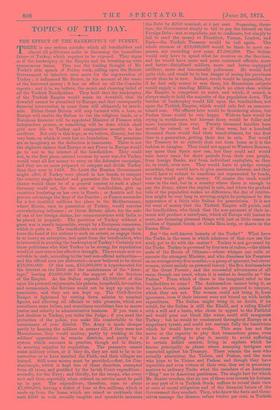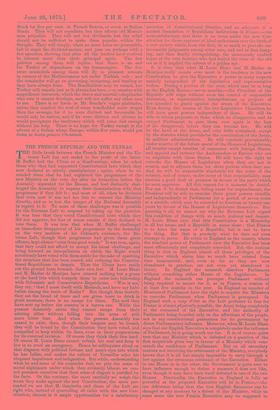TOPICS OF THE DAY.
THE Ell.h.CT OF THE BANKRUPTCY OF TURKEY.
THERE is one serious mistake which all bondholders and almost all politicians make in discussing the immediate future of Turkey, which requires to be exposed. They argue as if the bankruptcy of the Empire and its breaking-up were synonymous terms. This was the leading thought of Mr. Yorke's able speech of Friday week, calling upon the British Government to interfere once more for the regeneration of Turkey ; it influenced Mr. Baxter, in his account of the waste of the borrowed money ; it has an effect on all the Consular reports ; and it is, we believe, the secret and cheering belief of all the Turkish Bondholders. They hold that the bankruptcy of the Turkish Empire would mean its downfall, that its downfall cannot be permitted by Europe, and that consequently financial intervention in some form will ultimately be inevit- able. Either Great Britain will step forward with a loan, or Europe will enable the Sultan to tax the religious lands, or a European financier will be appointed Minister of Finance with independent powers, or something will be done which shall give new life to Turkey and comparative security to her creditors. Not only is this hope, as we believe, illusory, but the very basis on which it rests has no foundation. The premisses are as imaginary as the deduction is inaccurate. There is not the slightest chance that Europe or any Power in Europe would go to war in the interest of the bondholders. They could not, in the first place, extract revenue by mere war, for Turkey would want all her money to carry on the defensive campaign, and they are no more prepared to conquer and divide Turkey than they were in 1856. No doubt the Russian Government might offer, if Turkey were placed in her hands, to conquer the country single-handed and guarantee the Debt, but what chance would there be of a general consent to such a plan? Germany could not, for the sake of bondholders, give up countries bordering on her own to Russia ; or Austria sell for private advantage the keys of the Danube ; or France surrender for a few doubtful -millions her place in the Mediterranean, where Russia, once in possession of Turkey, would exercise overwhelming influence ; or Great Britain allow, for the sake of one of her foreign claims, her communications with India to be placed in jeopardy. The partition of Turkey without a great war is nearly impossible, except by a European consensus, which is quite so. The bondholders are not strong enough to force the hand of the nations to such an extent, or engage them in so heavy an enterprise, and apart from the bondholders, who is interested in averting the bankruptcy of Turkey? Certainly not those politicians who wish Turkey to be strong, for repudiation would at once renew her effective strength. The revenue now re- ceivable in cash, according to the best non-official authorities— and the official ones are distrusted—is now believed to be about £18,000,000. Of this sum, £15,000,000 is hypothecated for the interest on the Debt and the maintenance of the "draw- ings," leaving £3,000,000 for the support of the Services of the Empire. As the Sultan expends £2,000,000 of this upon his personal enjoyments, his palaces, household, favourites, and ceremonials, the Services could not be kept up upon the remainder, and they are not kept up. The Civil-Service Budget is lightened by cutting down salaries to nominal figures, and allowing all officials to take presents, which are sometimes mere bribes, and sometimes exorbitant fees to secure justice and celerity in administrative business. If you want a just decision in Turkey, you bribe the Judge • if you need the protection of the police, you make life comfortable to the commissary of your district. The Army is made cheaper partly by keeping the soldiers in arrears till, if they were not Mussulmans, they would mutiny, partly by winking at the soldiers' oppressions in remote districts, and partly by a system which amounts in practice, though not in theory, to securing supplies by requisition. The peasantry cannot resist military orders, or if they do, they are said to be in in- surrection or to have insulted the Faith, and their villages are burned. Still some money must be provided,—first, for Con- stantinople, which is kept free of these disorders, exempted from all taxes, and gratified by the lavish Court expenditure ; secondly, for the Navy; and thirdly, for the troops, who every now and then, especially when ordered on service must be paid up in part. The expenditure, therefore, runs to about £7,000,000, leaving a deficit of four or five millions, which is
' made up from the loans, which are raised so recklessly that each £100 in cash actually tangible and spendable increases the Debt by. £250 nominal, at 5 per cent. Supposing, there- fore, the Government simply to fail to pay the interest on the Foreign Debt—not to repudiate, not to confiscate, but simply to fail to send the money to Frankfort, Vienna, London, and Paris—the Turkish Treasury would be full again. The whole revenue of £18,000,000 would be there to meet ex- penses, not exceeding now some £7,000,000. The Sultan would only have to spend what he receives on the Services, and he would have more and more contented officials, more and better - disciplined soldiers, more and better-equipped artillery, more and less-rascally policemen. He would feel quite rich, and would be in less danger of seeing his provinces revolt than he is now. Indeed, revolt would be impossible, for if he had only money to arm them, his Mussulman subjects would supply a standing Militia which no other class within the Empire is competent to resist, and which, if armed, is always ready to hold the majority of the population down. The burden of bankruptcy would fall upon the bondholders, not upon the Turkish Empire, which would only feel an unaccus- tomed ease. Old officers here would be thundering abuse, but Pashas there would be very happy. Widows here would be crying in workhouses, but harems there would be fuller and more luxurious than ever. Twenty thousand families here would be ruined, or feel as if they were, but a hundred thousand there would find their bread-winners, for the first time in a generation, getting their due in coin. Nor would the Treasury be so entirely shut out from loans as it is the fashion to imagine. They could not appeal to Western Bourses, any more than Spain now can, but they could and would raise heavy sums for short periods from their own people, from foreign Banks, and from individual capitalists, as they do, in truth, even now. They would have to pledge strange securities, they would have to give enormous interest, and they would have to submit to exactions not represented by bonds, but they would get the money. Of course the crash would come in the end, but in a country where there is enough to pay the Army, where the capital is safe, and where the gradual ruin of the population makes no difference, the day of retribu- tion might be very long in arriving, might be postponed by the appearance of a fairly able Sultan for generations. It is not for want of money that the Turkish Empire will perish, and the bondholders, who think that the non-payment of their in- terest will produce a cataclysm, which all Europe will hasten to- avert, are dreaming pleasant things with just as little reason as holders of Spanish bonds, or Costa Rica scrip, or shares in the Emma Mine.
But " the well-known honesty of the Turks " What have- the Turks, in the sense in which admirers of that race use the• word, got to do with the matter Turkey is not governed by- the Turks. Turkey is governed by four sets of rulers,—the eldest. male of the House of Othman—whose whisper can exile or execute the strongest Minister, and who dismisses his Premiers on an average every five months ; —a group of ignorant, but clever - women, intent mainly on personal luxury ; the five Ambassadors, of the Great Powers ; and the successful adventurers of all races, though one creed, whom it is easiest to describe as " the Pashas." From which of these is the imagined relief to the bondholders to come ? The Ambassadors cannot bring it, as we have shown, unless their masters are prepared to conquer, which they are not. The women could not bring it, from ignorance, even if their interest were not bound up with lavish expenditure. The Sultan might bring it, no doubt, if he would, for the Sultan is still the Khalif, and a riding Khalif with a will and a brain, who chose to appeal to the Faithful and would pour out blood like water, could still reorganise Turkey ; but he would be condemned throughout Europe as a sanguinary tyrant, and could not restrain fully the fanaticism which he would have to evoke. This man has not the nerve or the capacity to play that tremendous game, even if he were willing to play it, merely to avoid suffering to certain Infidel usurers, living in capitals which he knows principally as places where annoying intrigues are concocted against his Treasury. There remain the men who actually administer, the Viziers, and Pashas, and the men. who hope to be Viziers and Pashas, and though they have capacities and even virtues of their own, they are in pecuniary matters to ordinary Turks what the members of an American. " Ring " are to American gentlemen. The single fact for which Mr. Baxter vouches, that no one of them ever invests his fortune or any part of it in Turkish Stock, suffices to reveal their view at once of moral obligation and of the financial future of the Government they conduct. They, who know the facts and them- selves manage the finance, refuse twelve per cent. in Turkish
Stock for five per cent. in French Rentes, or seven in Italian Bonds. They will not repudiate, lest they affront old Mussul- man prejudice. They will not tax dividends, lest the relief should not be sufficient to make them popular within the Seraglio. They will simply, when no more loans are procurable, fail to remit the dividend-money, and pass on, perhaps with a few speeches, showing that after all the lenders have received
in interest more than their principal again. The few patriots among them will rejoice that there is an end for Turkey of dependence on the loanmongers. The few utter scoundrels among them will fly to pleasant retreats in corners of the Mediterranean not under Turkish rule ; and the remainder will go on governing, intriguing, and stealing as they have always done. The Bondholders may be ruined, but Turkey will remain just as it always has been ;—a country with magnificent resources, which the brave and martial voluptuaries who own it cannot develope, and will not suffer any other race to use. There is no harm in Mr. Bourke's vague platitudes, unless they comfort the soul of some bondholder more stupid than the average, for if he were distinct and favourable he would only be untrue, and if he were distinct and gloomy he would precipitate the insolvency which will come fast enough without his help. There is no hope for Turkey except in the advent of a Sultan whom Europe, within five years, would put down as hostis generic Christians'.



































 Previous page
Previous page